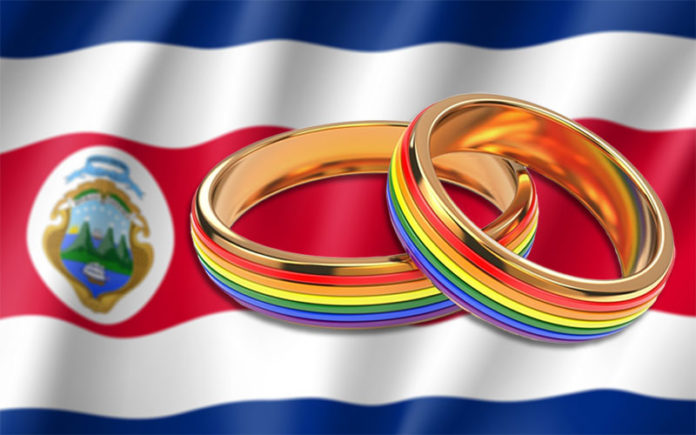Costa Rica legalizes same-sex marriage
On May 26, Costa Rica became the first Central American country to legalize same-sex marriage. Costa Rica joins Brazil, Ecuador, Argentina, Canada and the United States among other countries in the Americas to legalize same-sex marriage. “Today, Costa Rica officially recognizes same-sex marriage,” President Carlos Alvarado Quesada wrote on Twitter. “Today we celebrate liberty, equality and our democratic institutions. May empathy and love be the compass that guide us forward and allow us to move forward and build a country that has room for everyone.”
The first weddings were held Tuesday night. Celebrations were canceled because of the coronavirus pandemic, but a special program about LGBT rights was broadcast on public television and streamed online. “This change will bring about a significant social and cultural transformation, allowing thousands of people to marry,” Alvarado said during the program.
An August 2018 ruling by Costa Rica’s Constitutional Court ruled that laws preventing same-sex marriage were unconstitutional. The court gave the legislature 18 months to enact marriage equality or have the ruling recognizing same-sex marriages automatically go into effect once the deadline expired.
“Costa Rica is celebrating today: marriage equality has become a reality in the country — the first one in Central America!” the International Lesbian, Gay, Bisexual, Trans and Intersex Association (ILGA World) said. “We rejoice with you: congratulations to all those who worked so hard to make it happen!”
The Human Rights Campaign (HRC) applauded the decision. “Today, Costa Rica has made history, bringing marriage equality to Central America for the first time,” HRC President Alphonso David said in a statement. “Costa Rica’s LGBTQ community has worked tirelessly for years to make today a reality. This victory is theirs, and it inspires the entire global LGBTQ community to continue fighting to move equality forward.”
Hate crimes against LGBT people on the rise in France
Physical and verbal attacks on LGBT people rose by 36% in 2019 in France, according to figures released by the Interior Ministry. The statistics indicate a steady increase in hate crimes and prompted the French government to warn of homophobia and transphobia becoming “anchored” in the country.
In 2019, the police identified 1,870 victims of reported homophobic or transphobic offenses, compared with 1,380 in 2018. This represents a 36% increase in the number of victims of anti-LGBT acts, the Ministry said in a statement.
“These figures testify to the deep anchoring of homophobia and transphobia in society,” the Ministry said, adding that they form part of a broader increase in “hate acts and identity extremism.”
Verbal assaults constitute 33% of the crimes, while physical and sexual violence comprised 28% of the complaints. Three-quarters of victims were men and 62% of offenses were perpetrated against those under 35 years of age.
The report indicates that anti-LGBT incidents are nationwide, but 36% of the complaints were in the big cities, like Paris.
“This shows us that there is homophobia throughout the territory, including in rural areas,” Frederic Potier, the interministerial delegate for the fight against racism, anti-Semitism and anti-LGBT hatred told AFP.
The Interior Ministry called for “increased vigilance by the public authorities” and “more effort from society as a whole,” particularly at sporting events, which pre-pandemic had come under scrutiny for homophobic chants at soccer games and other sporting events.
Most LGBT+ Europeans fear harassment or assault
A new survey by the European Union’s Fundamental Rights Agency revealed that 6 out of 10 LGBTQ Europeans are afraid to hold their partner’s hand in public out of fear of harassment or assault, according to a major study from the organization.
The survey of nearly 140,000 people found progress on tackling anti-LGBT+ discrimination had largely stalled in recent years and in some areas appears to be sliding backward.
“Too many LGBTI people continue to live in the shadows, afraid of being ridiculed, discriminated [against] or even attacked,” said Michael O’Flaherty, director of the European Union’s Fundamental Rights Agency in a statement.
O’Flaherty added, “Even though some countries have advanced LGBTI equality, our survey findings show that overall there has been too little real progress, leaving many LGBTI people vulnerable.”
The online survey of LGBT+ people from across the EU as well as Britain, North Macedonia and Serbia, was conducted in 2019 as a follow-up to a similar survey undertaken by the human rights agency in 2012.
More than half of LGBT adults said they were open about their sexual or gender identity all or most of the time, a rise from 36% in the previous study.
But 43% said they had suffered discrimination over the last year, up from 37% in 2012.
One in 10 respondents said they had been sexually or physically assaulted in the last five years for being LGBT+.
More than half of trans Europeans said they had been discriminated against in the last year, compared to 39% of lesbians and 32% of gay men. Trans people were also least likely to trust their governments to protect their rights, according to the survey.
O’Flaherty said the current pandemic put LGBT+ people at even greater risk. “Their job and healthcare difficulties may worsen due to COVID-19. Policymakers should take note and do more to actively promote full respect for rights of LGBT+ people.”
